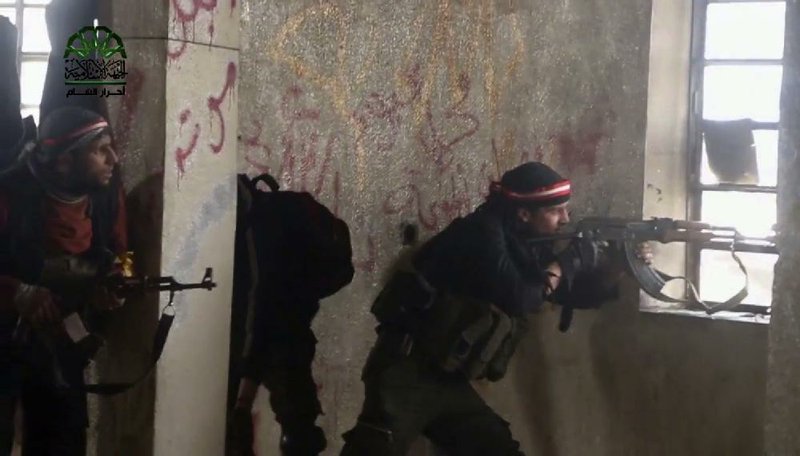BEIRUT -- Airstrikes and artillery fire shook Damascus on Tuesday as government forces tried to repel a second rebel attack on the Syrian capital in three days.
The military deployed tanks along the city's leafy Fares al-Khoury Avenue leading to the eastern Jobar and Qaboun neighborhoods, where opposition forces have been pinned for years, and the cracks of gunfire could be heard from Abbassin Square.
Government jets pounded the areas behind rebel lines, according to footage released by opposition factions, and fighters scrambled between rubble and burning buses to take up positions. Smoke clouded the skies.
Syrian state media said 15 people were wounded in rebel shelling across the capital. State-affiliated al-Ikhbariya TV said government forces had killed and wounded several "terrorists" and arrested several more.
A broad federation of insurgent factions renewed the assault on Damascus on Tuesday after an attack on Sunday stalled. That attack marked the most serious infiltration of the capital, seat of President Bashar Assad's power, in years.
On Tuesday, as on Sunday, the rebels detonated a car bomb in the eastern parts of the city before launching their attack. On Sunday, the al-Qaida-linked Levant Liberation Committee claimed responsibility for two car-bomb explosions.
The campaign brought together a number of rival factions, including the Levant Liberation Committee, two ultraconservative factions -- Ahrar al-Sham and the Islam Army -- and the Free Syrian Army-affiliated Failaq al-Rahman.
Assad's armed opponents are divided over strategy, with the al-Qaida-affiliated groups preaching a confrontational, military approach against the government, and others -- including the Islam Army -- agreeing to political discussions.
But the government's own intransigence -- ratcheting up military pressure against its opponents across the country despite peace talks in Europe and Asia -- appears to have brought the factions closer together.
Mohammed Alloush, the rebels' chief negotiator with the government at technical talks in Astana, Kazakhstan, said his group, the Islam Army, was prepared to send further reinforcements to the Qaboun front in Damascus.
Islam Army military spokesman Hamza Beirakdar said in a Twitter post, "Opening the Jobar front had a major effect in reducing the pressure on us and other fronts in Ghouta that have not calmed down in more than a year, and has contributed to scattering the Assad gangs."
Jobar has been besieged by government forces since 2013.
The Syrian government holds authority over most of the country's population after an overwhelming Russian intervention in 2015 turned the tide against advancing rebel forces. The government now controls the country's five largest cities.
Still, the parties to the United Nations-mediated Geneva peace process, including various rebel factions, are expected to attend the resumption of talks on Thursday, a U.N. spokesman said.
Alessandra Vellucci said the focus of this round will be governance, constitutional issues and elections, as well as counterterrorism, security and confidence-building measures.
The civil war in Syria, now in its seventh year, has seen various international coalitions involved in the violence, including Hezbollah, a Lebanon-based, Iranian-backed group that's helping Syrian government forces.
On Tuesday, Israel said it has concluded that Hezbollah's top military commander was killed in Syria last year by rivals within the Shiite militant group.
Israel's military chief, Lt. Gen. Gadi Eisenkot, told an academic conference on Tuesday that the death of Mustafa Badreddine in May illustrated "the depth of the internal crisis within Hezbollah."
He also said it reflected "the extent of the cruelty, complexity and tension between Hezbollah and its patron Iran."
An Israeli military official said Israel believes that the order to kill Badreddine was given by Hezbollah's leader, Hassan Nasrallah.
Israeli intelligence believes that Badreddine had been feuding with Iranian military commanders in Syria over the heavy losses his group had suffered on the battlefield. Both Iran and Hezbollah are backing Syrian government forces.
The official spoke on condition of anonymity because he was discussing a confidential intelligence assessment.
Hezbollah had no immediate comment.
At the time of Badreddine's death last year, Hezbollah said he had been killed by insurgent shelling in Syria. He was considered Hezbollah's top military official.
Israel considers Hezbollah to be a potent enemy, with over 100,000 rockets and missiles aimed at the Jewish state. But it also believes that the group has been weakened and demoralized after years of fighting alongside Assad's forces in Syria.
Information for this article was contributed by Albert Aji, Jamey Keaten and Josef Federman of The Associated Press.
A Section on 03/22/2017

